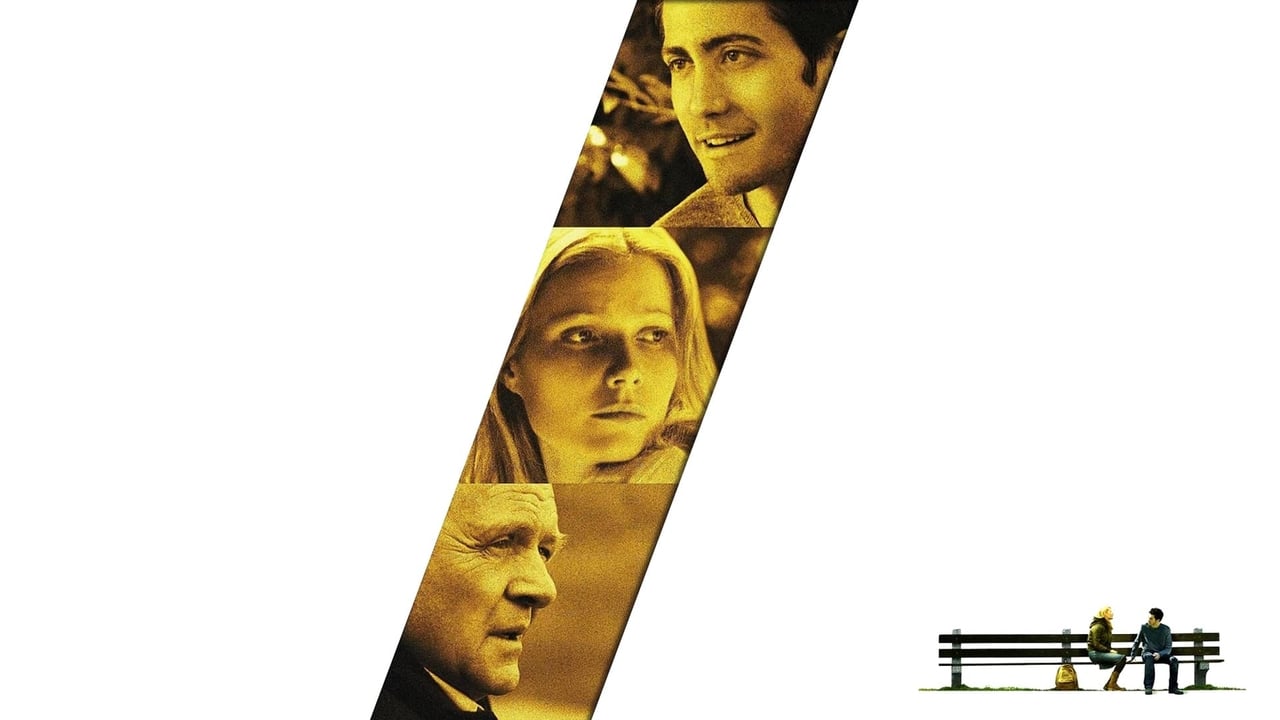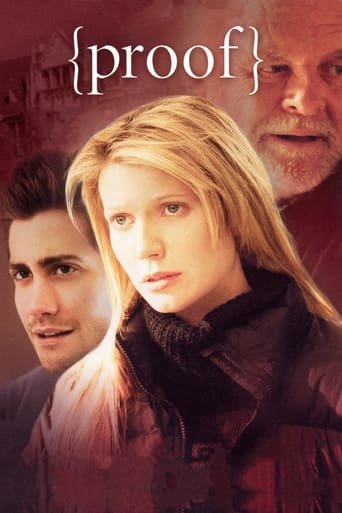

As usual, Paltrow brilliantly draws you into the story. Needless to say, all of the actors in the film deliver this regalement well, making you feel each and every emotion. While the tale itself is sad because it deals with the death of a loved one, there is a happy ending.When someone close dies, it does drag you through so many emotions brought on by the numerous contradictions in their lives. Facing up to these challenges makes us all either better or worse. After watching this film you might figure out or wonder which road it really is that you've chosen.
... View MoreIn the first totally boring 40 minutes of this movie, we learn that Robert was a mad mathematician in the math department at the University of Chicago, but he just died a few days ago and is to be buried imminently. His appearance is brought to us courtesy of flashbacks that run throughout the movie, which inform us that his daughter Catherine, a budding mathematician, dropped out of school to care for him. The movie progresses soon to the funeral, where one eulogist says, "This is the man who at the age of 22 invented the mathematical techniques for studying rational behavior." How impressive. The reality is that a great many mathematicians developed a wide range of techniques that social scientists use to study rational behavior. The writers plainly have no idea who developed any of those techniques or even what they are. Instead, they probably heard of John Nash who got the Nobel prize in Economics for his work on game theory. Nash also was nuts. That seems to be the model for Robert.The funeral scene is ridiculous beyond belief, and the post-funeral scene outside the church is nearly as bad. Then there's the wake. Complete idiocy. The wake scene is followed by the obligatory bed scene with Catherine and Hal (Robert's PhD student), which takes place during the wake. Catherine has seen Hal once or twice in the past. She shows him her room, which is cluttered with math books that she has read in her spare time, when she wasn't caring for her father. Catherine tells Hal he's not boring. Hal is so overwhelmed by such appreciation for a dull mathematician that he is overcome by desire to lay Catherine, which he does. Catherine, who was so upset during the funeral that she interrupted it with a rambling diatribe, now she lets this guy, whom she barely knows, screw her just a few hours after the funeral while a bunch of wild party-goers are downstairs celebrating/mourning her father's passing. After consummation, with Hal still on top of her and apparently still inside her, she breaks down in tears. Only in Hollywood could someone come up with such garbage.Then there is the dialog the next morning. This isn't worth going into in detail any more. Let me just say the dialog is utterly childish. So here we are over 40 or 50 minutes into the movie, and nothing interesting or credible has happened.At this point, Hal is looking over some of Robert's copious notes that Catherine has shown him. He is thunderstruck at what he sees, declaring, "It's a proof. Er, I think it's a proof. If it's what I think it is, it's a major breakthrough. A proof of something mathematicians have been working on for centuries...Blah, blah." No clue what that something might be, undoubtedly because the script writers wouldn't know addition from subtraction, much less what to say about an important problem in number theory. Then lo and behold, Catherine tells us that she, not her father, did the proof and wrote the notes that her new-found lover Hal is talking about. She who has not been to grad school yet. But don't forget, she reads math on the side. She also worked with her father. So at 27, with no formal training, she solves the great prime number puzzle of all time. (All this is coming out in the hangover everyone is in the morning after the big party at the wake and the gripping bed scene.) Are you getting the idea just how stupid this movie is? By the way, it has to add ridiculous political correctness to an already ridiculous plot. In the entire history of mathematics, not one major theory, not a single one, ever has been proved by a woman. Yet here we have an untrained dilettante figuring out a result that has puzzled great mathematicians for centuries. Why didn't they make her a bisexual trans-gender just to round things out? Unfortunately, Catherine's handwriting is nearly identical to her father's, so lover boy Hal and Catherine's witch-sister Claire doubt that Catherine did the work. Such drama! Incredibly gripping! Catherine cannot understand why lover boy Hal, he of the one-night stand just the night before, cannot believe that she did it. After all, the notes are in her father's handwriting. Catherine replies that her writing just happens to look like her father's. Later, after reading over the notes, lover boy Hal informs us that he has changed his mind. He adds that the handwriting problem is illusory because sometimes children have similar handwriting as their parents, especially if they spend a lot of time together. Every mathematician knows that, right? The subsequent banalities and foolishness spew forth in seemingly unlimited supply.One last thing does require comment. This movie indulges itself in the usual and grossly wrong view that all great mathematicians and scientists are crazy. In this movie, both Catherine and her father are disturbed, to say the least. The reason everyone (especially those who don't know anything about mathematics) thought A Beautiful Mind was so good is that the main guy does a great mental thing even though he is nuts. Believe it or not, that sort of thing is the exception, the very rare exception, not the rule. Yet in this movie, not one but two main characters are nuts and also happen to be brilliant. That's the only way that the shallow ignoramuses who write this drivel (THAT's who wrote it) can understand people with the intelligence, insight, knowledge, and imagination to do something original: they must be crazy because they aren't like Hollywood script writers.This movie is a tedious, boring, un-insightful, routine, and warped exercise in Hollywood's perverted, indeed depraved, view of the world. It is, in a word, terrible. If you have any brains at all, you run the risk of losing them if you watch this silly movie.
... View MoreIt has a great cast, Hopkins especially. However ....I kept waiting to see the characters break out of their middle class academic cocoon and touch the real world. But instead the film droned out through a silo of white privileged dullards who all seemed to have their heads up their Pi hole. I feel asleep twice and had to rewind and saw Paltrow ( skinny blonde) yelling about vegetarianism and jojoba etc. then I was sorry I had rewound. The kind of bland text continued with a series of first world problems and concerns that don't seem to connect with reality. Paltows concerns about her mental health seem quite justified as her behaviour is inexplicable but it's hard to tell when the character only interacts with people who are all rather academic and mathematicians who apparently (according to Jake) live on drugs because they are ( warning, another first world problem alert) afraid that their creativity peas at age 23. Boo hoo. I couldn't help wondering if this play featured peeps who had real jobs and lives would their concerns not be more real worldly.
... View MoreProbably the most striking quality of proof is the simplicity of its narration. With a story which could have been put on celluloid in the most complex manner has been told in a very subtle manner. With great performances by Gwyneth paltrow and jack gyllenhall, this one is a must watch for everyone who can appreciate the beauty with which the screenplay portrays various emotions of every character and is thoroughly engrossing. Proof takes you through a journey of a daughter dealing with the demise of her father and at the same time trying to keep hold of sanity. Proof could easily been another "A beautiful mind" but refrains itself from doing so by focusing on emotions rather than relationships. This is an under rated masterpiece.
... View More